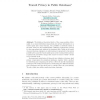Free Online Productivity Tools
i2Speak
i2Symbol
i2OCR
iTex2Img
iWeb2Print
iWeb2Shot
i2Type
iPdf2Split
iPdf2Merge
i2Bopomofo
i2Arabic
i2Style
i2Image
i2PDF
iLatex2Rtf
Sci2ools
TCC
2005
Springer
2005
Springer
Toward Privacy in Public Databases
Abstract. We initiate a theoretical study of the census problem. Informally, in a census individual respondents give private information to a trusted party (the census bureau), who publishes a sanitized version of the data. There are two fundamentally conflicting requirements: privacy for the respondents and utility of the sanitized data. Unlike in the study of secure function evaluation, in which privacy is preserved to the extent possible given a specific functionality goal, in the census problem privacy is paramount; intuitively, things that cannot be learned “safely” should not be learned at all. An important contribution of this work is a definition of privacy (and privacy compromise) for statistical databases, together with a method for describing and comparing the privacy offered by specific sanitization techniques. We obtain several privacy results using two different sanitization techniques, and then show how to combine them via cross training. We also obtain two uti...
Related Content
| Added | 28 Jun 2010 |
| Updated | 28 Jun 2010 |
| Type | Conference |
| Year | 2005 |
| Where | TCC |
| Authors | Shuchi Chawla, Cynthia Dwork, Frank McSherry, Adam Smith, Hoeteck Wee |
Comments (0)

